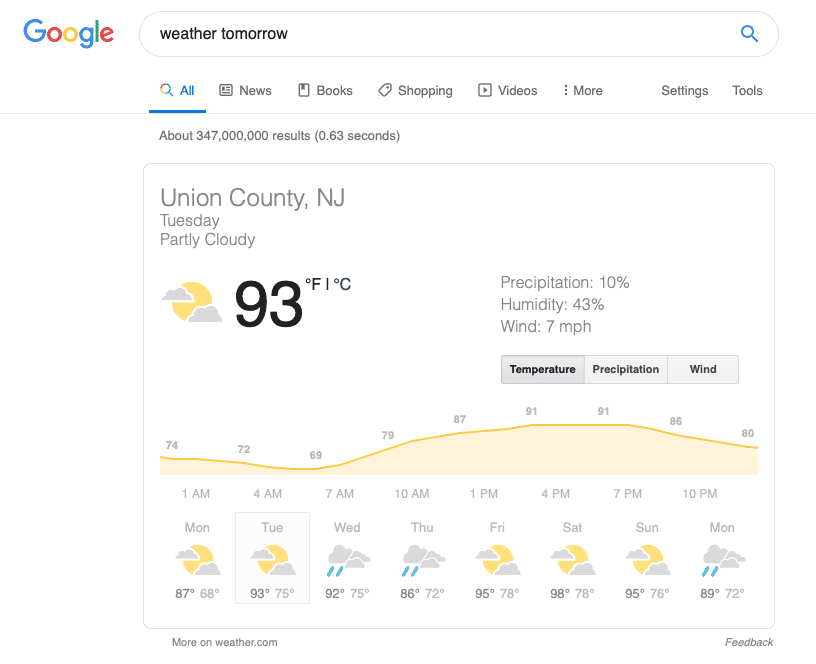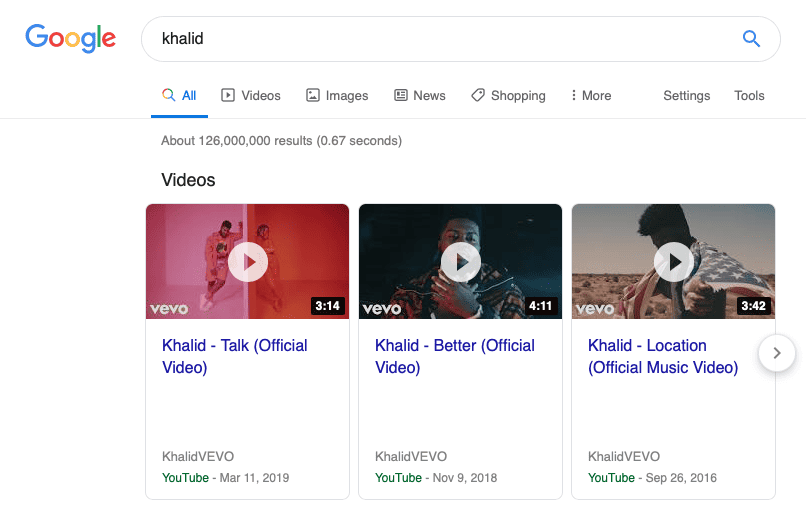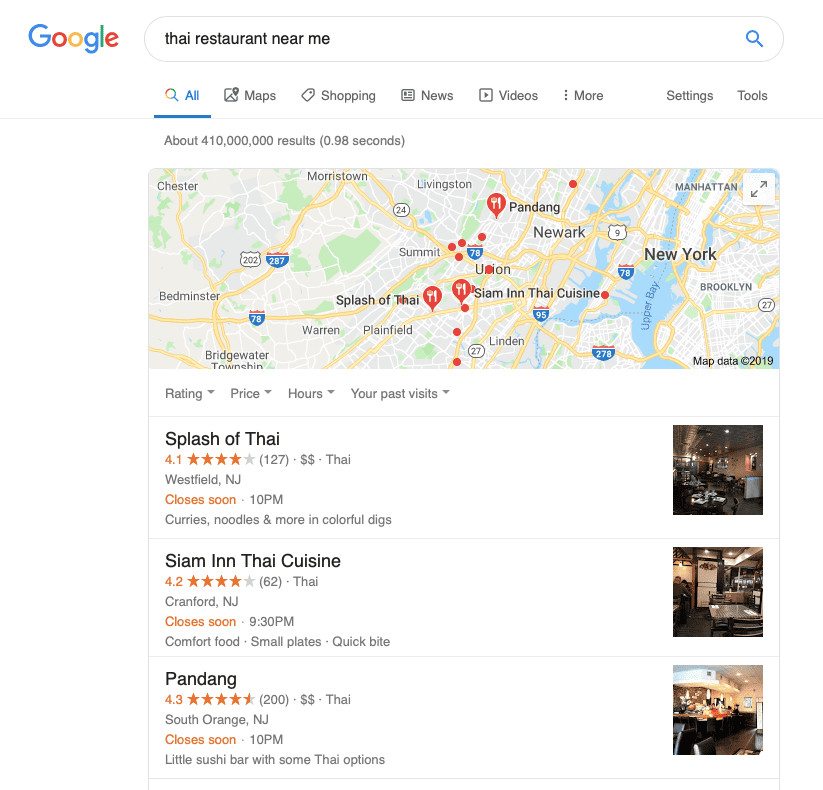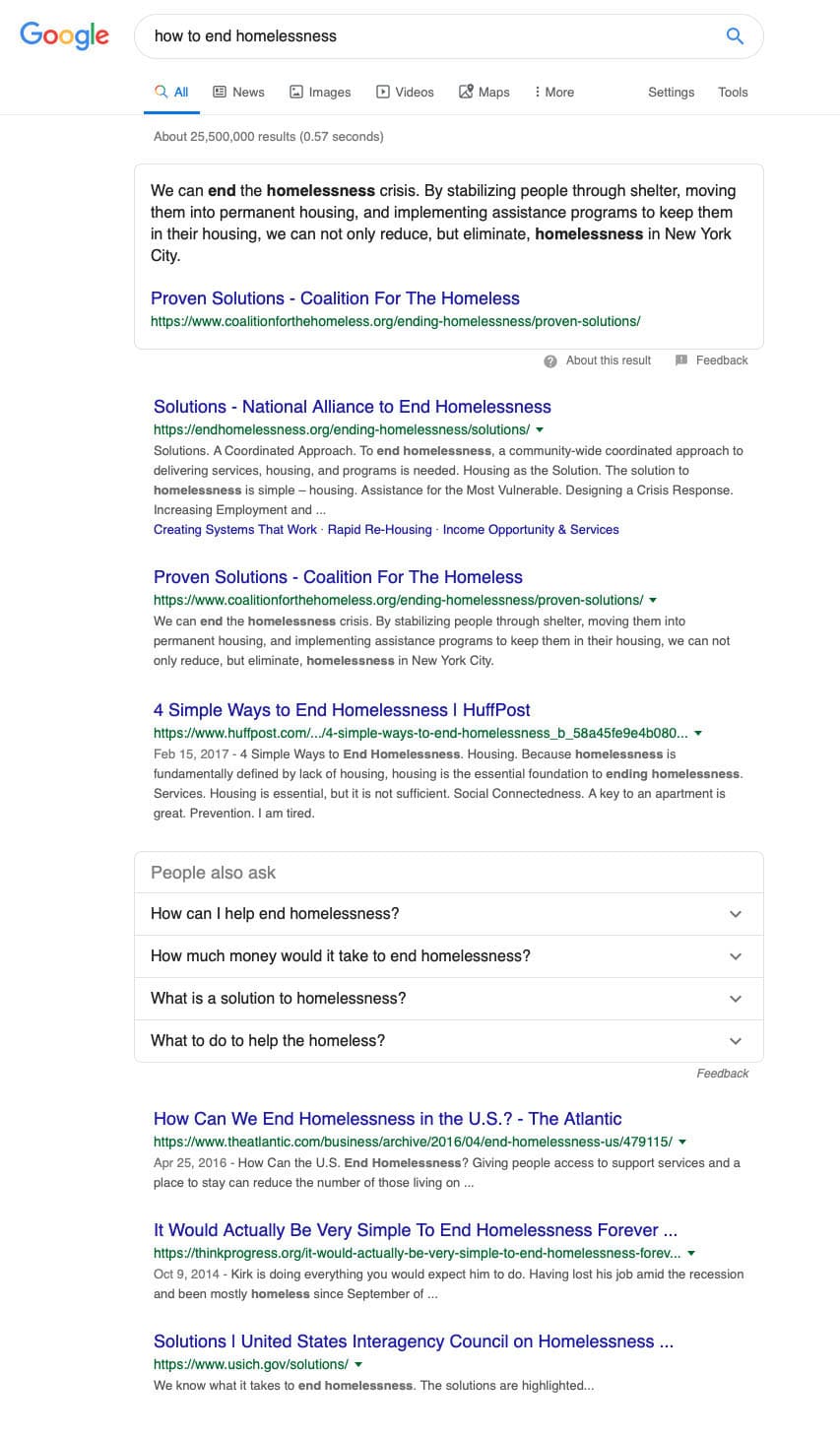August 15, 2019
Google is taking over search traffic. What does that mean for your non-profit?
Recently, SparkToro’s Rand Fishkin painted a bleak picture of the current state of search, detailing a trend that most of us in the digital marketing community have been witnessing for years: that Google itself is increasingly providing answers to searcher’s web queries at the expense of content publishers and websites. Among his findings:
- Google solves half of all searches without any clicks at all (a.k.a., “zero-click searches”)
- In Q1 2019, Google directed nearly 12% of all search clicks back to Alphabet-owned properties (Alphabet is Google’s parent company). This is an enormous number, considering that in Q1, Google fielded over 150 billion search queries.
- In that same quarter, Google sent 7.2% of all traffic to paid results
Looking at these facts, it’s easy to want to give up on search as a marketing tactic. After all, who wants to go through the trouble of optimizing a website, publishing content, and then working to amplify it if Google themselves are just going to provide the answer – and in some cases use your content to do so?
But there’s still hope in search – if you’re a non-profit. In fact, search will continue to benefit non-profit organizations in particular while other industries continue to face an uphill battle. Here’s why:
1. Non-profits are somewhat insulated from Google’s moves (for now)
If you consider the types of searches for which Google now provides “Google-based” and/or “zero-click” answers, they generally fall into the consumer/popular/utility-based search category – think: weather, sports, movies, restaurants, maps, brands and so forth:



But as of yet, Google has not usurped long-tail search – i.e., searches that are longer in form and seek a specific, detailed answer.
This is a win for non-profit organizations that publish content related to their mission – content that Google typically draws upon to answer a specific, or long-tail search.
Here’s an example. These were the results when I typed “how to end homelessness” into Google this morning:
 You’ll note in the example above that even with a long-tail search, Google is highlighting what it feels is the best answer (the “answer box”) to the detriment of the rest of the results – but this is still a rich, varied search engine results page (SERP) that allows the searcher to consider other websites.
You’ll note in the example above that even with a long-tail search, Google is highlighting what it feels is the best answer (the “answer box”) to the detriment of the rest of the results – but this is still a rich, varied search engine results page (SERP) that allows the searcher to consider other websites.
For non-profits, the opportunities available in long-tail search are a key reason to continue to publish thorough, quality content around questions you would expect your audience to ask.
Search will continue to benefit non-profit organizations in particular while other industries continue to face an uphill battle.
2. The number one spot is now more powerful than ever
Of all the links listed in the SERP example above, the top answer stole the show. This is of course the Google Answer Box, a.k.a., position zero, which Google began implementing a couple of years ago.
It doesn’t take a marketing genius to see that capturing this top spot can have enormous benefits. For years, our music education client SpreadMusicNow held the top spot for the query “The importance of music” (they’ve since slipped). More search traffic came to that page – which we adroitly parlayed into other successes – than to any other page on the site (and given that they have a Facebook audience of over 220,000 that drives significant site traffic, that’s saying something).
Accordingly, there are opportunities in getting search right. Your organization should be working consistently to meet the criteria Google has set to rank in that top spot: summarizing the answer in the top of your post, page speed, backlinks, but most importantly, providing content that answers the user’s question better than all others.
3. For non-profits, there’s more to SEO than just ranking
Of course, the main reason to dedicate time and resources to SEO is to gain the clicks that top-ranking results provide. But there are ancillary benefits to pursuing a rigorous, consistent SEO program as part of your overall marketing mix.
First, by following the practices that Google outlines to gain search results you’ll provide your users with a great overall experience. Page speed, usability, mobile optimization – all things the Google search algorithm considers in rankings – are also things that will benefit your audience irrespective of search.
Next, publishing high-quality content – even if it may not rank near the top spot – strengthens your brand. First, it helps validate you to donors, stakeholders and potential team members, but also, by publishing regularly, you and your team hone your expertise and positioning in the areas related to your mission.
As we advise all clients, success on the web means rolling with the inevitable changes;
a flexible, opportunistic mindset is key. The Internet’s biggest players increasingly aim to keep traffic to themselves, and although they may be doing it to provide their users with the best experience, this hardly helps content creators who are looking to be found on the web. Whatever these companies’ motives may be, why risk falling into obscurity? Tailor your approach to take advantage of the platforms’ nuances and reap the rewards.
TAGS: content marketing, digital marketing, Search Engine Optimization, SEO, website design nj
Visiting?
Here we are.
350 Springfield Avenue #200
Summit, NJ 07901
info@bcsinteractive.com
973.377.1175
Are you ready to learn?
As a digital marketing agency for nonprofits, we write about the work and campaigns we produce, and share what we’ve learned along the way.
Count Me InSubscribe to the Blog
Sign up for monthly marketing insights you can put to use right away.
Subscribe Here